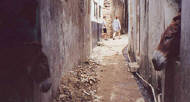Someone finally pointed me in the direction of the polytechnic school. I visited it with my proposal and resume in hand, considering it my last hope. There were three buildings, which the sign at the entrance said were built by a German aid organization, where carpentry, dressmaking, typing, and computer classes were held. Maryam, the head of the computer department, gave me a tour of the place. For most students the polytechnic was their only hope for a job in the future. The carpentry teacher showed me how they made traditional beds, doors, and cabinets. The students looked up curiously from their tools and machines. The three computer teachers, all surprisingly women, were enthusiastic about my volunteering at the school.
“Mr. Mwangi is in Nairobi, but he will come back on Monday.” Mr. Mwangi was the manager, and of course, he was out of town. It took weeks of vacillating on Mr. Mwangi’s side, and threats of leaving on mine, and many strings pulled by various people who later became friends, but they finally let me start working. Soon after that, the chairman of the polytechnic arranged for me to stay for free at the Stone House, one of Lamu’s nicest hotels. I felt like I was living in the lap of luxury, with free soap and toilet paper and a friendly staff that let me use the restaurant kitchen.
My routine consisted of teaching two classes a day, at ten at the morning and six in the evening. Teaching Word and Excel in a town where the majority of the population didn’t have running water was a contradiction, but Africa was full of them. The computer room was unadorned except for two long wooden tables where ten computers sat side by side, and a blackboard but usually no chalk. My first day I was introduced to two students, Salim and Christine, who were finishing up Word. According to Maryam, they would be ready to take the final exam in a few weeks. They still didn’t know how to save a file or use a mouse. They never asked questions or indicated that they understood what I was saying. The Kenyan education system had taught them to shut up and memorize useless information. I spent many hours sweating in that stuffy room, inventing exercises and exams as I went along.
Dismus, my evening student, was much easier to teach. We quickly moved from Word to Excel, always joking and exchanging tidbits of our lives during lessons. He was from up-country, and had been transferred to Lamu to study the ocean tides. He was the kind of Kenyan I grew to respect: hardworking, intelligent, and motivated. He was one of very few who knew something about politics and wasn’t afraid to voice his opinions. After every class, he would shake my hand and say “Asante sana, mwalimu” – “Thanks a lot, teacher.” Teachers are regarded very highly in Africa, and I always had to hide a grin when people in the street called me mwalimu.
Working at the polytechnic magnified the cultural differences between the Kenyans and me. They didn’t see me as a tourist, but I was far from being one of them, no matter how much ugali I ate with my hand or how much Swahili I spoke. I think the other teachers were bewildered by this girl who let soccer players cut her hair, smoked Embassy Lights with her tea, and came to work in a T-shirt and kanga, those colorful sarongs that African women use for everything. But working there privileged me with the chance to really live in this corner of Kenya and to suspend my reality – that of a wandering backpacker – and step into another – one that for these people was simply everyday life.
|
![]()
My days were a sum of little moments that were all shaped by the place. No where else but Lamu could I buy samosas and bajias on the street from little girls who would hold out the snacks and say “Shilingi moja.” No where else could I joke at the Bosnia Caf� with Champion, the Bob Marley wannabe, or get invited to eat pilau by the ancient blue-eyed store-keeper who I never saw outside the tiny space behind his counter and who asked me three times a day how I liked Lamu.
It was where I learned to carry a flashlight at night to avoid the donkey droppings in case the electricity got cut off, where the Big Shop had only two aisles of merchandise, and where the ambulance was a wheelbarrow. It was a place that kept surprising me with what hid underneath the surface: buibui-clad Muslim prostitutes, the crazy homeless residents who never starved, the beach boys who told tourists everyday “Lamu hakuna matata. Lamu paradise!” and whose dream included a mzungu and a ticket out of Africa.
